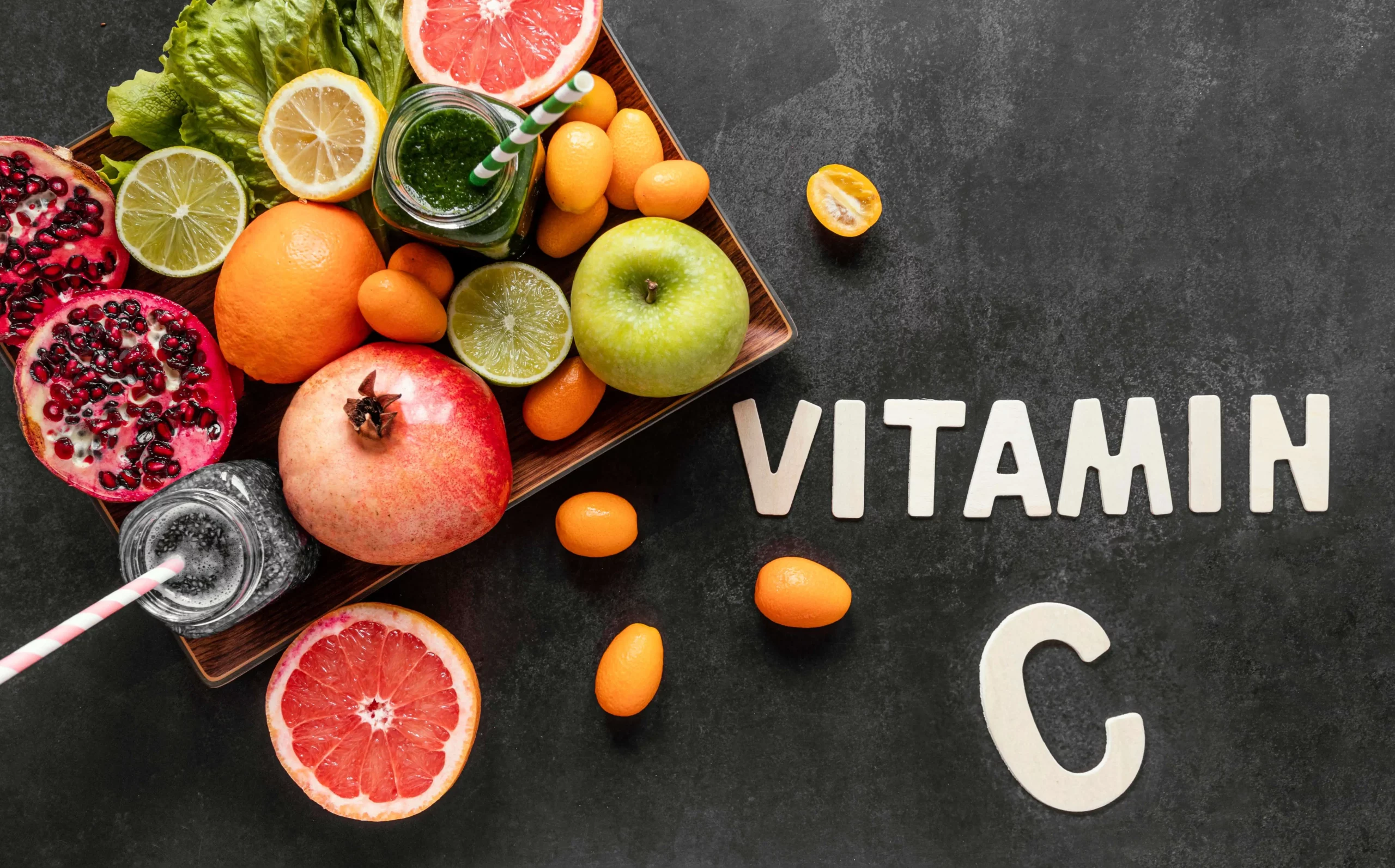Last updated on May 13th, 2023 at 07:32 am
If you are looking for a vitamin that is packed with antioxidants and skin-beneficial properties? Look no further than vitamin C! This essential nutrient is found in citrus fruits and offers a plethora of health benefits. In this Blissreport, we will dive into the benefits, sources, dosage, and side effects of vitamin C, so keep reading to learn all you need to know about this essential nutrient.
What is Vitamin C, Good For?
Vitamin C, also known as ascorbic acid, is a water-soluble nutrient that boosts the immunity of our body, plays an important role in the maintenance of our health, and is essential for supporting our immune system and preventing scurvy. Our body cannot produce vitamin C on its own, so it is important to regularly consume foods rich in vitamin C to maintain good health and immunity.
As a nutrient vitamin C has multiple health benefits that include anti-oxidant and skin protective properties as such it is not only good for the health of our skin rather it is also beneficial for our teeth, bones, immune system, and heart health, additionally, it prevents damage to small blood vessels. Vitamin C is commonly found in citrus fruits such as oranges, lemons, limes, and grapefruits, as well as in vegetables like potatoes, broccoli, peppers, and tomatoes.
Vitamin C as a chemical was identified by Hungarian biochemist Albert Szent-Györgyi in 1932. However, even before 1932, doctors used citrus fruits to treat scurvy, a common health problem until the 19th century. One of the important functions of vitamin C is its role in the production of collagen, which is one of the most abundant proteins in our body and is the building block of connecting tissues like bones, muscles, tendons, ligaments, and skin. As a supplement, Vitamin C is generally well tolerated and can be consumed without any major complications.
Vitamin C Benefits:
Provides Immunity Boost:
Vitamin C has multiple health benefits. Firstly, it increases the production of white blood cells, which plays a significant role in boosting immunity. Additionally, vitamin C acts as an antioxidant, that scavenges free radicals in the body which may cause Oxidative stress and prevent cell damage. Vitamin C is known to increase immunity, which in turn, results in better health. Secondly, the effects of vitamin C in reducing the severity and duration of infectious diseases such as respiratory infections, are well-known and thoroughly documented. Thirdly, vitamin C has wound-healing properties, which may promote and aid in the faster healing of injuries. Lastly, a daily intake of vitamin C can boost immunity in immuno-compromised adults. To ensure a good supply of vitamin C, citrus fruit and vegetable juices can be consumed to meet the recommended daily allowance (RDA).
Collagen Production:
Vitamin C helps in the production of collagen which is a fibrous protein found in connective tissue required to build our bones, joints, and skin. Collagen protects our skin from sunburn and reduces wrinkles. There are varieties of collagen serums that contain vitamin C and are used to improve skin health. Our body needs vitamin C to generate newer blood vessels and muscles.
By helping in the production of collagen which acts as a scaffold to provide strength and structure to the body Vitamin C can help keep our cartilage and bones strong. Research suggests that adequate vitamin C intake may achieve higher bone mass density and may also help reduce the chances of minor bone fractures.
Antioxidant Properties:
Vitamin C works as an antioxidant which may help in skin purification and removal of excess toxic content like free radicals which causes harm to our body. These radicals are caused by pollution and toxic chemicals produced naturally in the body. Free radicals can cause diseases like cancer, neurodegenerative diseases, cardiovascular diseases, insulin resistance, inflammatory diseases, and age-related diseases so as an antioxidant it can prevent and slow down the production of free radicals in the body.
Antimicrobial Properties:
Vitamin C is acidic in nature, due to its low PH value it acts as an antimicrobial which may help prevent infections. Also, it has been shown to strengthen the immune response by promoting the production of white blood cells (WBC) in the body.
Vitamin C for Skin Health:
- It can reduce hyperpigmentation
- It can reduce redness
- Can promote collagen production
- Can prevent sagging (looseness of skin)
- Protect skin against sunburns
- Helpful in wound healing
- Provides hydration
Iron Absorptions:
Iron is an essential part of the body that is also required to form hemoglobin present in the red blood. Our body requires around 12 mg of iron every day in order to function properly. Vitamin C helps in the absorption of iron in the body and makes it bioavailable. Vitamin C is especially more important for those who consume a plant-based diet as it can make non-heme iron bioavailable to increase its absorption in the body.
Reduces Tiredness and Fatigue:
Daily intake of vitamin C can reduce factors such as tiredness and fatigue, caused by a busy lifestyle and stressful atmosphere, and help maintain our overall health.
Supports Metabolism and Psychological Function:
Vitamin C helps facilitate the metabolism of several micronutrients, minerals, and vitamins that include iron, calcium, magnesium, and vitamin D. This can improve metabolism and overall body functioning. Lack of vitamin C can result in Scurvy, which may cause mental health problems.
Helpful in Gum and Teeth Health:
Vitamin C has several benefits for oral health. It keeps the connective tissue of gums healthy and strong, reduces the chances of scurvy (bleeding of gums), and provides tooth mobility while reducing the chances of gingivitis (a gum problem that causes redness and irritation). A proper intake of vitamin C helps fight against these gum problems and makes our teeth stronger.
Vitamin C Food Sources:
Vitamin C is found in a variety of food sources, however, the amount of vitamin C is higher in some sources than the others. We have included a list of easily available food sources which contain vitamin C
Fruits
Citrus fruits:
- Kakadu plum: 1000-5300 mg of Vitamin C per 100g
- Camu camu: 2000-2800 mg of Vitamin C per 100g
- Acerola cherries: 1600-1800 mg of Vitamin C per 100g
- Rosehips: 1250-2000 mg of Vitamin C per 100g
- Orange: 53 mg of Vitamin C per 100g
Tropical fruits:
- Guava: 228.3 mg of Vitamin C per 100g
- Mango: approximately 35 mg of Vitamin C per 100g
- Papaya: approximately 87 mg of Vitamin C per 100g
- Pineapple: good source of Vitamin C
- Bananas: good source of Vitamin C
Berries:
Kiwi: high source of Vitamin C
Strawberry: excellent source of Vitamin C
Melons:
Cantaloupe: 30 mg of Vitamin C per 100g
Vegetables:
- Bell Pepper: 128 mg of Vitamin C per 100g
- Thyme: 160 mg of Vitamin C per 100g
- Parsley: 133 mg of Vitamin C per 100g
- Broccoli: 89 mg of Vitamin C per 100g
- Cauliflower: 48.2 mg of Vitamin C per 100g
- Kale: 93.4 mg of Vitamin C per 100g
- Brussels sprouts: 85 mg of Vitamin C per 100g
- Spinach: 28.1 mg of Vitamin C per 100
Dosage of Vitamin C:
How much Vitamin C should I take daily?
While the upper limit of Vitamin C is 2000 mg we only need a percentage of that amount. According to the USDA recommended daily allowance (RDA) of vitamin C is 75-90 mg a day, which can be easily achieved by consuming the foods listed in this article.
Possible Side Effects:
The upper limit of vitamin C is 2000 mg a day. it is excreted from the body in urine. As the body can not store vitamin C taking a high amount of vitamin C is not advisable. Consuming a higher than the recommended dose of vitamin C might cause some side effects, which are:
- Nausea (uneasiness of the stomach)
- Vomiting
- Headache
- Heartburn
- Sleepiness and Fatigue
- Stomach cramps
- Skin flushing (sudden reddening of face and another part due to increased blood flow)
- Diarrhea
- Flatulence (passing of gas from the digestive system)
- Gastrointestinal problem
What We Conclude:
In conclusion, vitamin C is a nutrient that provides multiple health benefits, that include improved immunity, collagen synthesis, and bone health. It can be consumed through natural sources like fruits and vegetables or as a supplement. Additionally, vitamin C has been shown to have potential preventive effects for cancer and cardiovascular issues while also functioning as an antioxidant. By incorporating vitamin C into our diets, we can take a proactive approach to achieving and maintaining good health.



